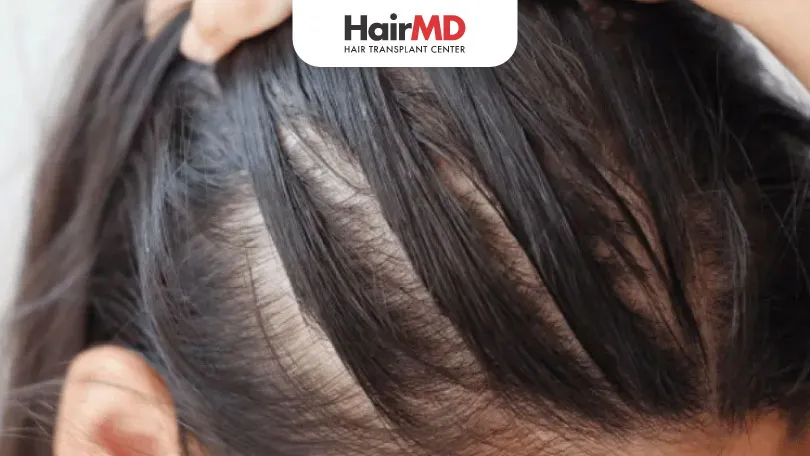25th Feb, 2023

Shedding around 50-100 hair strands from follicles every day is a part of the natural hair growth cycle. The cycle encompasses three phases; growth, rest and fall. In the fall phase, hair starts to shed and then regrow from the follicle.
However, many external and internal factors can disturb this natural cycle and lead to hair loss. Hair loss is a hair condition where excessive hair falls with no signs of hair growth, leading to balding. Hormones are one of the internal factors that can cause hair loss. Continue with the blog to learn more about estrogen and hair loss.
What’s covered in the article?
- Estrogen and Hair Loss
- What Causes Low Estrogen and Hair Loss?
- How to Treat Estrogen Effects on Hair?
- Conclusion
Estrogen and Hair Loss
Estrogen is a female sex hormone that helps regulate crucial processes like menstruation and promotes the proper functioning of the bone and skin. Low estrogen and hair loss are due to a reduction in the levels of estrogen when a woman enters menopause. High levels of estrogen promote hair growth like in pregnancy, while on the other hand, when the level of estrogen goes down at the time of menopause, hair fall occurs. Female pattern baldness normally arises due to these low levels of estrogen.
What Causes Low Estrogen and Hair Loss?
Below are the problems that may reduce the levels of estrogen
- Underweight or Overweight- Estrogen production is lower in women who have very little or very high body fat.
- Excessive Exercise- High-intensity exercise may affect estrogen hormone production
- Stress- Estrogen may fall during menstruation and the menopausal phase.
- Certain Medications- Some medications may reduce the levels of estrogen
- Thyroid- Hypothyroidism is when low thyroid hormone is produced, which also leads to low estrogen and other female hormone production.
How to Treat Estrogen Effects on Hair?
The following treatments can reverse the effect of low levels of estrogen on hair-
Proper Lifestyle
A proper lifestyle can treat the effects of estrogen. Take a proper low-fat diet to control estrogen levels. Intake salmon, tuna, flax seeds, garlic, almonds, moong bean sprouts, soy products and walnuts. Drink plenty of water and reduce excessive exercise. Maintain a healthy weight and sleep on time to manage stress.
Hormone Replacement Therapy (HRT)
Estrogen replacement therapy can help treat hair loss due to menopause. You must consult a dermatologist to discuss this therapy.
Medications
Your hair doctor might prescribe medications like minoxidil and finasteride to promote hair growth after estrogen hair loss.
If you are suffering from hair loss, visit an expert dermatologist at HairMD, Pune to find the cause behind estrogen hair loss and treat it on time.
Do You Know?
Nearly 250 Patients Visit HairMD
Everyday For Various Hair Concerns?
(Your journey to healthier and fuller hair starts here!)
Meet Our Dermatologists
Conclusion
In conclusion, estrogen plays a significant role in maintaining healthy hair, and a decrease in its levels, especially during menopause, can lead to hair loss. By understanding the causes of low estrogen and adopting appropriate treatments, such as a healthy lifestyle, hormone replacement therapy, or medications, it is possible to manage and reduce hair loss.
For personalized advice and effective solutions, it’s essential to consult a dermatologist. At HairMD, Pune, experts can guide you in addressing hair loss due to estrogen imbalances.
Further Reading
Redensyl vs. Minoxidil: Which is the Better For Hair Growth?
Discover the differences between Redensyl and Minoxidil for hair growth. Learn about their effectiveness, side effects, and which treatment might be better for you.
How to Reverse Grey Hair Naturally?
Grey hair can be reversed naturally with proper nutrition, stress management, and the right hair care routine. Discover effective ways to slow down greying.
How Laser Hair Removal Works: The Guide to Hair
Get smooth, hair-free skin with laser hair removal. Learn how it works, its benefits, and what to expect during treatment for long-lasting hair reduction.
Everything you need to know about Laser Hair Removal
Learn everything about laser hair removal, including benefits, procedure, and aftercare tips.
Have thoughts? Please let us know
We are committed not only to treating you, but also educating you.











